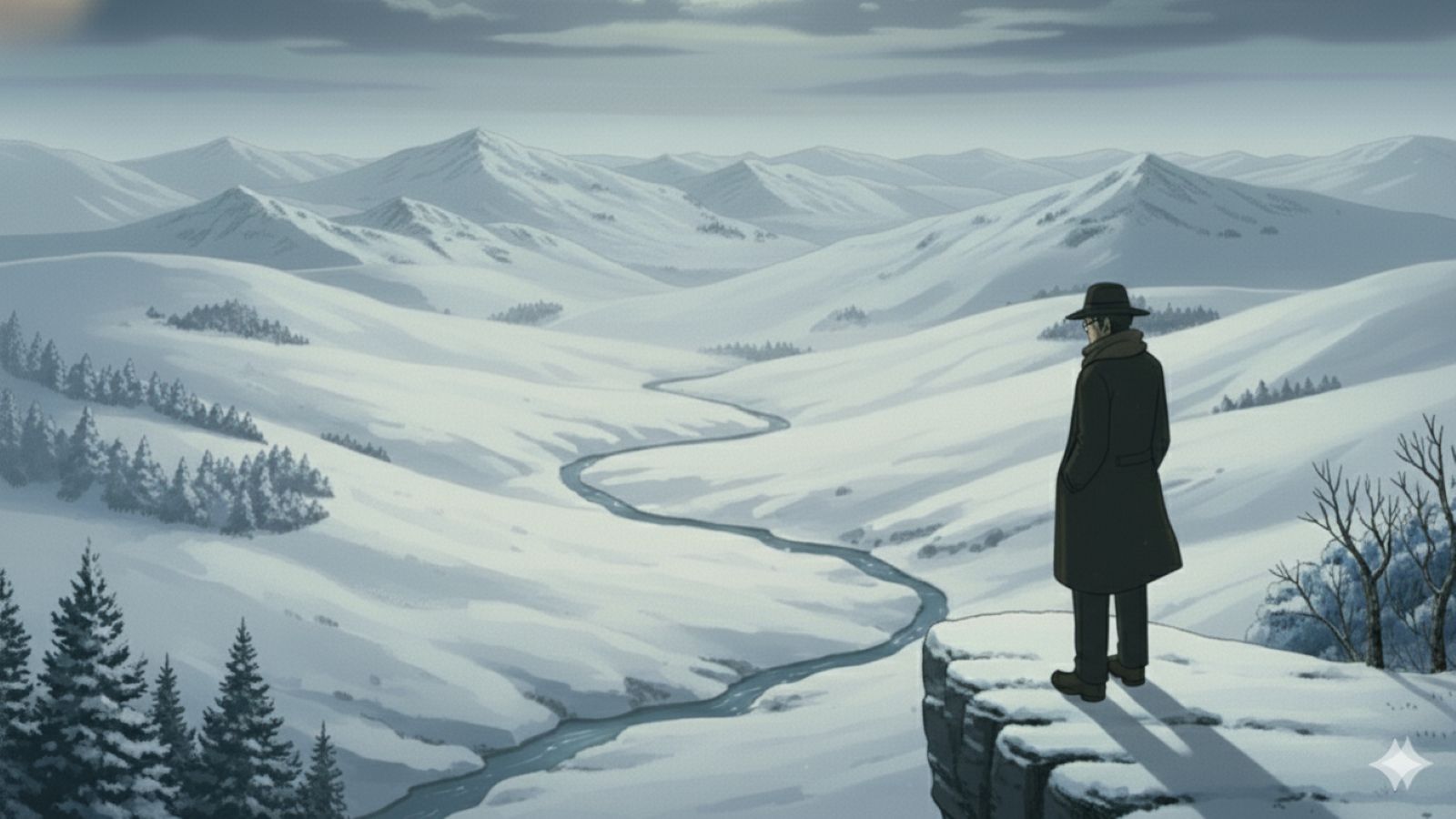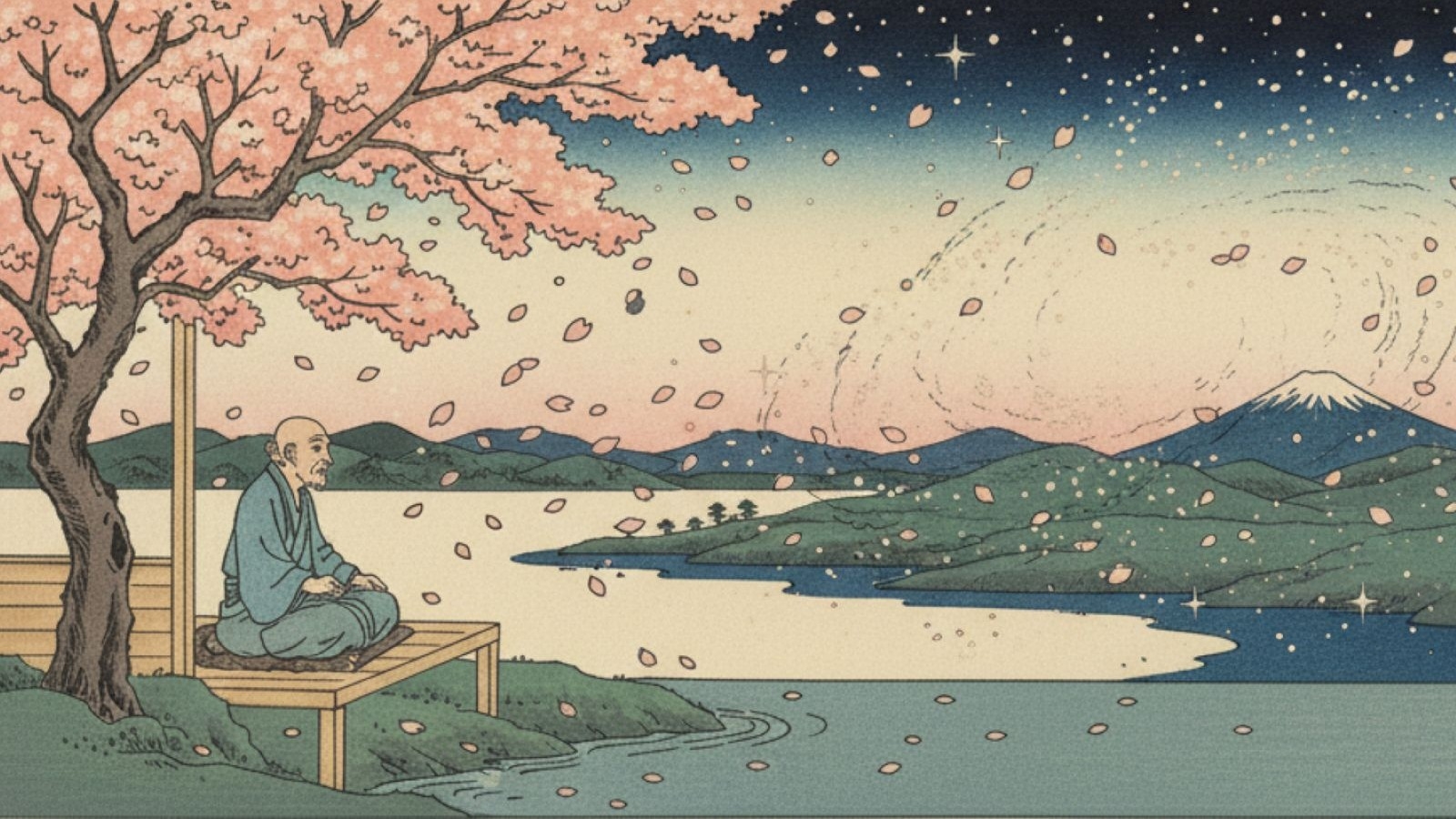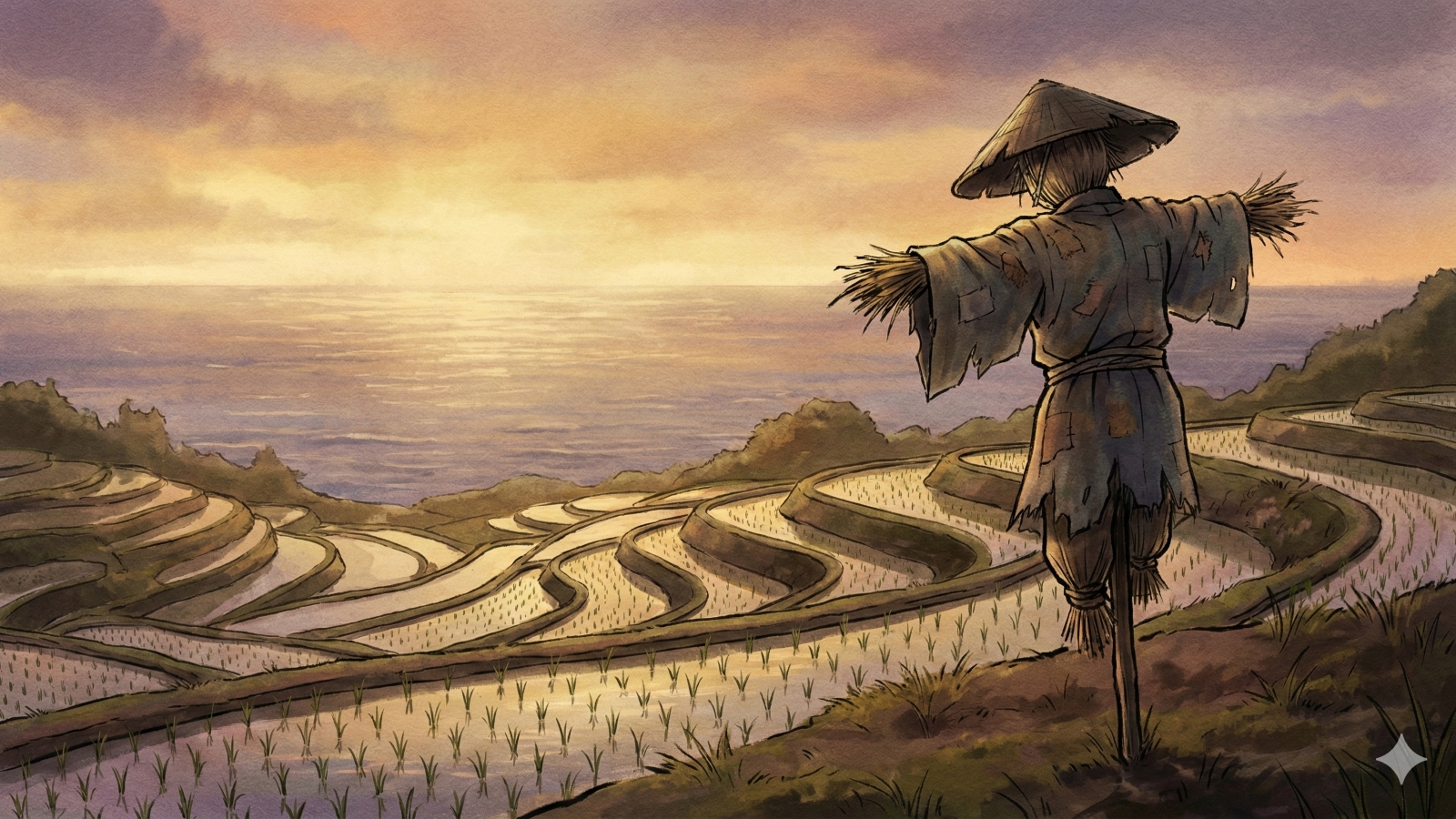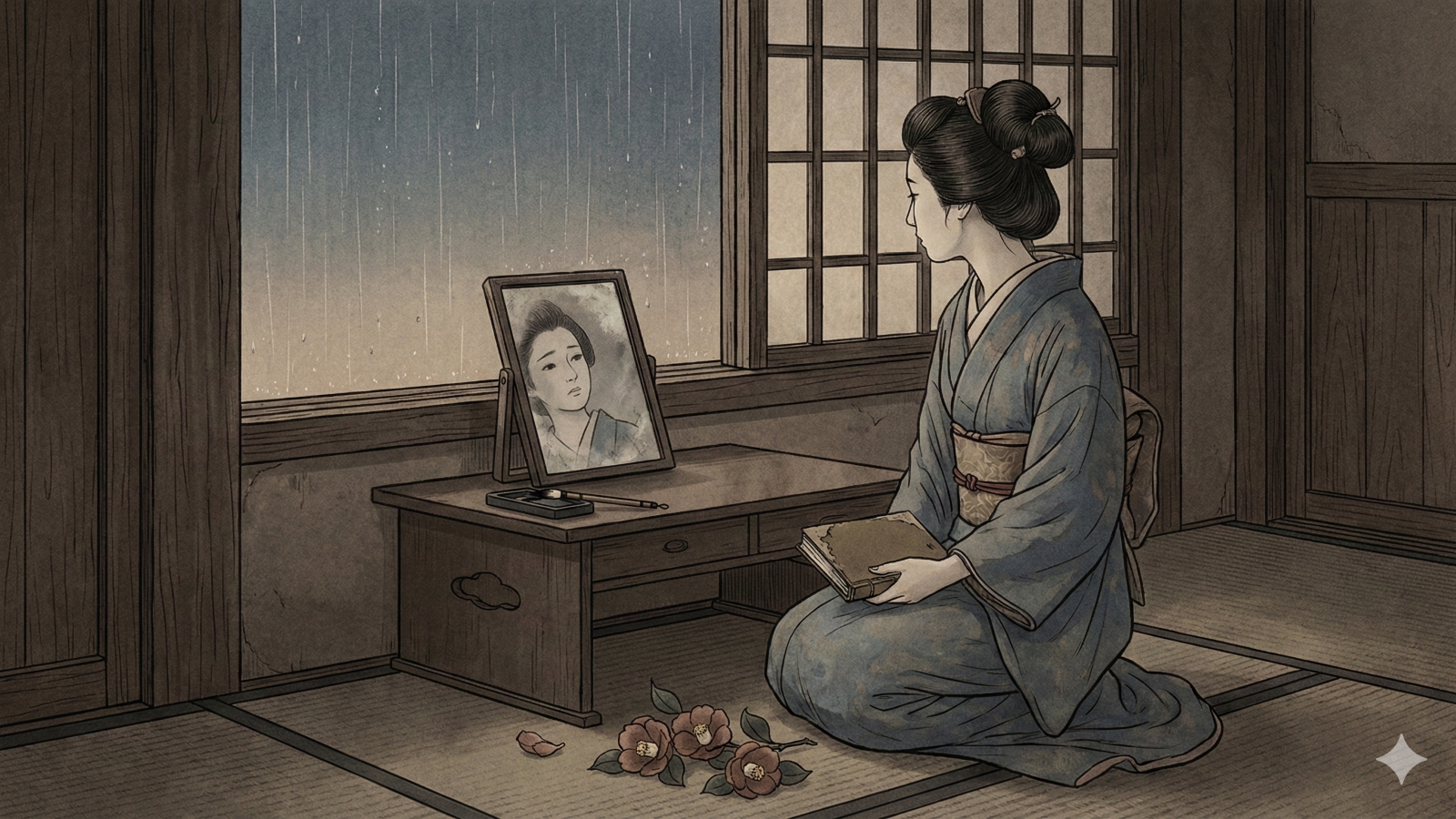The Shadow Cast by Light - Solitude and Self-Esteem in Japanese Literature
When faced with dazzling happiness, why do we notice the depth of our own shadow and step back? This collection explores the painful yet beautiful relationship between happiness and solitude, which cling to each other like light and shadow. We take as our guide the words of literary giants-from the 'fear of happiness' depicted by Dazai and Soseki, to the 'affirmation of solitude' discovered by Nakahara and Miyazawa.

「幸福なんだ、この人たちは。自分という馬鹿者が、この二人のあいだにはいって、いまに二人を滅茶苦茶にするのだ。」
“These people are happy. A fool like me is going to step between them and ruin them both.”
— Osamu Dazai, No Longer Human
[Commentary]
Have you ever been faced with a dazzling light, only to notice the depth of your own shadow and quietly withdraw? The protagonist, Yozo, secretly glimpses his lover, Shizuko, and her daughter as they laugh happily while playing with a rabbit. Faced with their modest yet perfect happiness as a family, he becomes convinced that his existence as a “fool” will only bring them misfortune. To avoid destroying their happiness, he chooses to leave their circle. This can be seen as a painful, self-sacrificial decision to cast himself into solitude for the sake of those he loves. The scene of happiness, paradoxically, is what seals his loneliness.
「弱虫は、幸福をさえおそれるものです。綿で怪我をするんです。」
“Even happiness is frightening to a coward. You can get hurt by cotton.”
— Osamu Dazai, No Longer Human
[Commentary]
Why do people sometimes cast away the very happiness they have attained? This is a line where the protagonist, Yozo, analyzes his own psychology after playing the clown to escape from the first genuine happiness he has ever felt. He is driven by the fear that someone like him is not worthy of happiness, or that this happiness will inevitably be lost, wounding him more deeply. Here lies a state of mind so extremely delicate and fragile that it feels it could be injured even by soft cotton. This passage masterfully depicts how a lack of confidence in maintaining happiness—in other words, low self-esteem—can drive a person into solitude. The perverse psychology of choosing to remain in misery for fear of being hurt by happiness is painfully palpable.
「私は今より一層淋しい未来の私を我慢する代りに、淋しい今の私を我慢したいのです。」
“Instead of enduring a future me who is even lonelier than I am now, I want to endure the lonely me of the present.”
— Natsume Soseki, Kokoro, Chapter 15 [Sensei]
[Commentary]
Is there a paradox in choosing present loneliness for the sake of future peace? This line comes from a scene where “Sensei,” a man admired by the protagonist “I,” explains his creed of avoiding deep relationships with others. Sensei fears that even if he is respected now, that relationship may change, and he could be subjected to humiliation in the future. He would rather endure his current loneliness from the outset than taste that future shame. This reveals a deep mistrust in the fragility of human relationships and a delicate self-esteem that is terrified of being hurt. This single sentence encapsulates the anguish of a solitude that must be accepted as a consequence of a self-esteem that can only be protected by cutting off ties with others.
「若いうちほど淋しいものはありません。」
“There is nothing so lonely as youth.”
— Natsume Soseki, Kokoro, Chapter 8 [Sensei]
[Commentary]
Is youth a season that, while full of hope, also harbors a bottomless loneliness? The protagonist, a student, finds himself drawn to “Sensei’s” house for no particular reason and begins to visit frequently. Sensei perceives the unfulfilled emptiness deep within the student’s heart and offers him these words. It is as if he is suggesting that the essence of loneliness is the state of having an excess of youthful energy that, unable to find a target, is left suspended in mid-air. This single line accurately captures the vague sense of solitude felt by a young person who seeks, but cannot obtain, a true connection with others.
「私、なんだか急に生きたくなったのね……あなたのお蔭で……」
“I… I suddenly feel like I want to live… because of you…”
— Tatsuo Hori, The Wind Has Risen, Summer [Setsuko]
[Commentary]
The presence of a loved one can sometimes be a light that pulls a person back even from the brink of despair. These words are a poignant and beautiful confession whispered by the heroine, Setsuko, who suffers from a serious illness, at the moment she realizes her love for the protagonist, “I,” and rediscovers her hope for life. It shows that a strong desire to live has sprouted in her heart, which until then had been in a state of quiet resignation. In a story where the shadow of death looms large, this line can be seen as a scene that radiates a particularly vivid brilliance of life. However, this affirmation of life also contains within it the fear and sorrow of its potential loss. The paradox of a heart saved from loneliness by love, only to face the new anguish of confronting its own fate, is condensed into these brief words.
「こんな人けの絶えた、淋しい谷の、一体どこが幸福の谷なのだろう」
“In a desolate, lonely valley like this, where on earth is the Valley of Happiness?”
— Tatsuo Hori, The Wind Has Risen, The Valley of the Shadow of Death
[Commentary]
The same scenery can show a completely different face depending on the state of the viewer’s heart. This sentence is a monologue from the protagonist, “I,” as he revisits the memorable place he once spent time with his late fiancée, Setsuko. The place that foreigners called the “Valley of Happiness” and bustled with life in the summer now appears as nothing more than a desolate landscape in the snow-covered winter. His heart is filled with a deep loneliness and sense of loss after losing his beloved, and he can no longer find any trace of happiness in the valley. This question confronts us with the truth that happiness does not reside in places or environments, but is ultimately something created by the human heart. The heart-wrenching cry of a soul who now perceives this place of memories as the “Valley of the Shadow of Death” is deeply moving.
「私は二人のさも愉しげな対話を何かそういう絵でも見ているかのように、見較べていた。」
“I watched their cheerful conversation as if I were looking at a painting.”
— Tatsuo Hori, The Wind Has Risen
[Commentary]
Even when in the circle of loved ones, why does the heart sometimes feel distant? His fiancée, Setsuko, speaking with her visiting father, shows a girlish expression the protagonist has never seen before. Their lively conversation is colored by past memories shared only by father and daughter. Unable to enter their circle, the protagonist can only gaze upon the cheerful pair from a slight distance, as if appreciating a painting. This sense of distance feels more psychological than physical, highlighting the deep loneliness and alienation one can feel even at the side of a loved one. It seems to be a feeling akin to quiet resignation, faced with the world of another that no one else can enter.
「なんだか私の生きてゐるといふことも、まんざら無意味ではなささうに思へる……」
“Somehow, it seems that my being alive might not be entirely meaningless after all…”
— Chuya Nakahara, A Cloudy Autumn
[Commentary]
Have you ever been on the verge of despair, only to be saved by a small flower at your feet? The “I” depicted in this poem is as miserable as an abandoned dog, sunk in a solitude so deep he grieves his own existence. But one night, he listens to the cry of a cat in the vacant lot next door. As he sympathizes with its sorrowful, yet life-filled cry, a subtle change occurs in his heart. This line captures the moment when, by empathizing with the modest existence of another, he realizes that his own life, which seemed meaningless, might hold some value. It is a faint yet certain affirmation of life that can only be felt in the midst of deep solitude, and a sign of recovering self-esteem.
「孤独を恐れぬこと、といふことである。」
“It is to not fear solitude.”
— Chuya Nakahara, Poetry and the Modern Age
[Commentary]
Do you ever feel your own heart being drowned out by the voice of the majority? In this essay, Nakahara criticizes modern society as being “rhetorical,” a place where only superficial tact is prized. In an age where spiritual conviction and longing are lost, and art is often overwhelmed, how should we be? This powerful sentence is presented as the answer to that question. It is a declaration of the resolve to face one’s own inner self, unafraid of standing out from the crowd. True spirituality and art are protected only by maintaining one’s proud solitude, without being swept away by trends or peer pressure. This line is a timeless message that teaches the nobility of leaving the comfort of the herd and standing on one’s own two feet.
「それみづからぞ樹のこゝろ」
“That itself is the heart of the tree.”
— Kenji Miyazawa, Heart
[Commentary]
If the trees swaying in the wind and the rocks standing firm each possessed their own unique “heart,” what form would it take? This short poem depicts the inner nature that dwells within natural objects. It sings that a tree swaying under a cloudy sky is an expression of its “heart” as a tree, and a rock absorbing heat in the sunlight is the work of its “heart” as a rock. The conclusion that a tree is just a tree, and a formless rock is just a rock, seems to quietly indicate the preciousness of existence as it is, without being compared to anything else. In this, one can feel a philosophy of quiet self-esteem and solitude, of being self-sufficient without needing to become anything else.
(Editorial Cooperation: Haruna Ishita, Momona Sassa)

Japanese Views on Seasons - The Gaze of Literary Figures
Japanese literary figures have deeply engaged with the shifting seasons and the workings of life through various forms of expression such as novels and essays. Their delicate sensibilities and keen powers of observation open the door to a dialogue with nature for us, teaching us the beauty and philosophy hidden within everyday landscapes.

Japan's Primal Landscapes - A Tale of Memories Told by the Land
Superimposing the deceased onto the buzzing of flies, seeing gods in one-legged scarecrows. For Japanese people, these mysterious stories were not fantasy, but "life" itself, right next door. Longing for lands beyond the sea, legends remaining in ancient mounds. Why not travel through the frightening yet gentle "primal landscapes of the heart" gathered by Kunio Yanagita, Lafcadio Hearn, and others?

To Wonders Beyond Logic - The Beautiful Abyss Peered into by Scientists
Science is not just cold calculations. It is awe for nature beyond human understanding and an endless quest for beauty. Seeing the universe in a snowflake, feeling the ferocity of life in roadside grass... These are the adventurers of knowledge who confronted the overwhelming "mysteries" that appear only at the end of logic. We touch upon the records of their quiet yet passionate souls.

The Soul Screaming "I" - Stories of Fate and Pride by Modern Women
Should women's lives be plastered over with resignation to fate? Or is it a battle to break through social barriers and win one's own "life"? The dry self-mockery spat out by Ichiyō, the poignant scream released by Akiko for her beloved. We listen to the cries of their souls as they resisted the chains of their era, struggling through the mud to establish the "self."